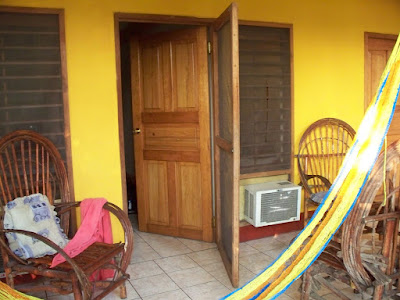
With a stop to say good-bye and get soft drinks, we went more or less straight from the microbus to our hotel in Rio Dulce, Brun's, the same hotel on the river and under the bridge where the 2007 summer mission team stayed on the way to and from El Estor. The majority of the pastors who accompanied the spring 2009 team to Rio Dulce also stopped by our rooms for a few minutes. I got a chance to share a good half of my photos with a couple of the pastors. We felt a little sheepish stahying in these comparatively luxurious standards - not so much by U.S. standards - but with CNN on the TV, air-conditioned rooms with hot showers and conventional U.S.-style toilets, and an open-air resaurant on the riverfront where we could eat salad and drink drinks with ice. On our way to dinner, Ellen wondered out loud why North American mission teams always seemed to need a drink after spending time with their partners (and then at dinner some of us . . ). Pictured far below is Maria, a woman from whom I bought a bunch of items for gifts, mainly Tuesday morning during breakfast. I also ventured into town, in Rio Dulce, before blogging at the hotel's Internet cafe and before dinner. Ellen went to bank, and I found something very few people would have in the United States: Rio Dulce T-shirts.
-- Perry


















